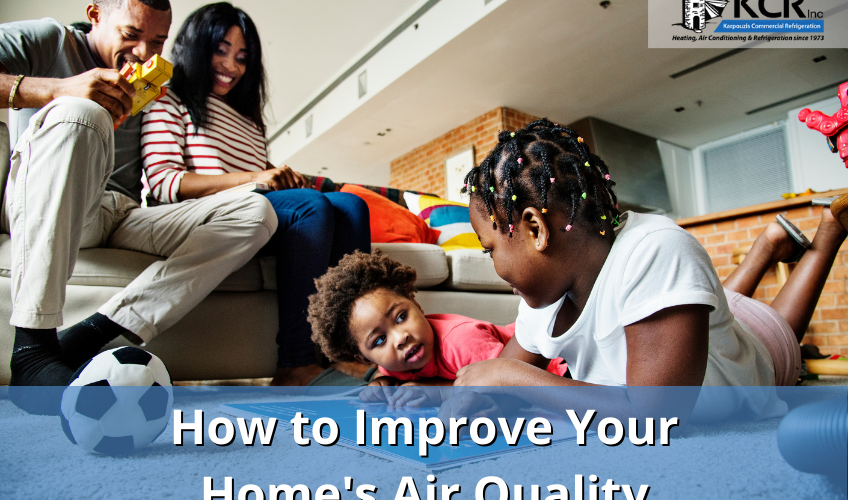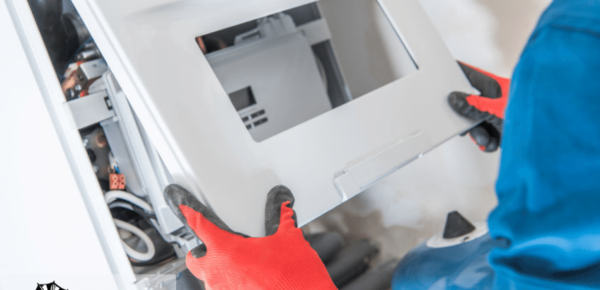How to Improve Your Home’s Air Quality
Indoor air quality is something that many homeowners and landlords take for granted with their properties. However, even if you don’t realize your home has poor air quality, it can cause various health issues.
When you don’t take measures to improve your property’s indoor air quality, many harmful contaminants can linger in the oxygen. These contaminants might include mold spores, dust mites, pollen, carbon monoxide, cleaning chemicals, asbestos, and other pollutants.
Breathing these contaminants can lead to respiratory problems, cardiovascular problems, and exacerbated allergy and asthma symptoms. For these reasons, it’s worth taking a few measures to improve the indoor air quality of your Massachusetts home. Here, we’ll examine some of the most effective ways.
What We’ll Cover:
Does your home need a new heating system?
How to Measure Your Indoor Air Quality
Understanding and monitoring the air quality inside your home is essential for maintaining a healthy environment, especially for families with children. Fortunately, there are various do-it-yourself methods and devices available that allow you to accurately assess the air you breathe daily.
For a straightforward approach, consider investing in an indoor air quality monitor. These devices can measure a range of pollutants, including particulate matter (PM2.5), volatile organic compounds (VOCs), carbon dioxide, humidity, and temperature. Brands like Awair and IQAir offer user-friendly monitors that provide real-time feedback and suggestions for improvement directly through smartphone apps.
Additionally, radon test kits are another vital tool, particularly in areas where radon levels are known to be high. These kits are available at most hardware stores and can be left in the basement or lowest level of your home to collect samples over a few days. Once complete, these samples go to a lab for analysis, giving you a clear picture of your home’s radon status.
If you’re concerned about allergens and dust, a digital hygrometer can help monitor humidity levels. Keeping humidity around 30-50% helps reduce the presence of dust mites and mold spores, common triggers for allergies and respiratory issues.
With these tools, homeowners can take proactive steps to ensure their indoor environment is safe and healthy for their families. Keep reading to learn how you can improve your indoor air quality with a few easy tips and tricks.
1) Invest in a Heating System Installation
If you have an older, outdated heating system in your home, it may distribute many airborne contaminants around the household. By investing in a new forced-air heating unit, you can enjoy various significant benefits, including much cleaner indoor air.
Consider contacting a reputable local heating company that specializes in heating installation. After the heating system installation, your property will likely experience a more consistent climate, improved energy efficiency, and better indoor air quality.
If you search online for “heat companies near me,” you’ll find reliable professionals who offer residential and commercial heating installations.

2) Replace Your HVAC Air Filters
The air filters attached to your property’s heating and cooling systems play an important role in keeping the indoor air clean and healthy. Whenever your residential HVAC system is cycling, those filters trap many airborne pollutants. This precaution prevents them from cycling into the HVAC unit and around the house.
Over time, though, HVAC air filters run out of space to catch contaminant particles. When that happens, it makes it much harder for the HVAC system to do its job efficiently and allows many pollutants to circulate throughout the living space.
For these reasons, replacing your HVAC air filters with clean ones is imperative. Depending on the specific type of filter you use, you should switch them out at least once every couple of months—especially during the summer and winter.
3) Clean Your Air Ducts
Whenever your property’s HVAC is circulating warm or cool air, that air must pass through your home’s air ducts to reach the different areas of the house. When the ductwork is clean, the air that passes through remains relatively clean. However, contaminants like mold spores, pest droppings, and dust tend to accumulate inside air ducts over time. And if you don’t have your property’s air ducts cleaned periodically, enough contaminant particles will build up to start causing problems.
One issue is that the air that cycles through the ductwork will inevitably pick up many pollutants, spreading them throughout the home’s oxygen. Plus, the contaminants will begin to obstruct the airflow of the HVAC system, forcing it to increase its air pressure. That uses extra energy and puts unnecessary strain on the unit. Fortunately, there are qualified duct-cleaning heat companies in your area.
At least once every few years, you should bring in these heat companies to thoroughly clean and inspect your property’s air ducts. Doing so will improve indoor air quality and provide the following benefits.
- More consistent household climate
- Lower energy costs
- Better-smelling house
- Catching leaks and other ductwork problems early
- Fewer HVAC problems
Schedule a free HVAC consultation today
4) Purchase Indoor Plants
Many homeowners and property managers are unaware that indoor plants can significantly affect air quality. Many types of plants that you can buy at your local nursery can actively remove certain contaminants from the oxygen. Just be careful that your home air conditioning doesn’t cause them to wither and dry out.
By purchasing several of these plants, you can give your property a new look while improving indoor air quality. That said, it typically takes quite a few plants to make a major difference in air quality, so you may want to distribute them throughout the household. Below, we’ve listed a few indoor plants that are known to remove pollutants from the air.
- Snake plant
- Bamboo palm
- English ivy
- Spider plant
- Boston fern
- Chinese evergreen
- Rubber plant
5) Control the Humidity
Airborne contaminants aren’t the only thing that can worsen a home’s indoor air quality. If the air in your property contains too much or too little moisture, that can also cause significant problems.
When the humidity level in a home is too high, it can cause breathing issues, mold growth, and general dampness around the house. When the humidity level is too low, it can lead to respiratory illnesses, dry skin, itchy throat and nose, and other unpleasant issues.
If you want to control the humidity level of your property directly, you should consider purchasing a humidifier, a dehumidifier, or both. Typically, the humidity level rises during the summer and decreases during the winter, so there are benefits to having both devices.

Key Takeaways
Whether you’re a homeowner or a landlord, it’s important to maintain the indoor air quality of your property. Keeping your indoor air clean and free of harmful contaminants can help preserve the health and comfort of your household.
Investing in a modern forced-air heating system, regularly changing your HVAC air filters, and having your ducts cleaned periodically ensures that your property’s HVAC system does its part to keep the indoor air clean.
You can also take additional measures, like controlling the humidity, purchasing indoor plants, improving the home’s ventilation, and cleaning your house more frequently. As long as you make a consistent effort, you can ensure optimal indoor air quality on your property.
THE #1 HEATING COMPANY IN CENTRAL MA
Your HVAC solutions should work for your exact needs. For nearly 50 years, KCR has provided homes and businesses with peace of mind and temperature control. We’re proud to serve our customers efficiently and flexibly in residential and commercial heating repair.
You can also follow us on Facebook for exciting clean heating updates and promotions!







